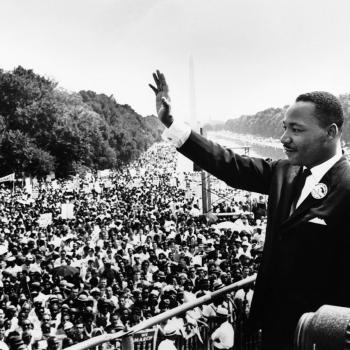When The King's Speech garnered the Best Picture distinction at Sunday night's Academy Awards—and its leading man captured the Best Actor prize—there was surely much rejoicing from LDS women around globe. Mormon women have an obsession with Colin Firth's suave reticence that goes back, as far as I can determine after extensive research, to his portrayal of Mr. Darcy in the A&E miniseries Pride and Prejudice. What made Sunday's celebration notable is not the fact that Mr. Firth played an attractive, high-status British man who struggles with just-dangerous-enough inner demons, ultimately triumphing in the company of an attractive, devoted woman—no, that part sounds somewhat familiar. What was different Sunday night is the fact that Colin Firth played this character in an R-rated movie, a movie that many of his LDS fans have seen.
The taboo on viewing R-rated films has been a strong one in Mormon culture. It's a bright-line distinction of the sort that we favor, easy to assess and really quite easy to live; one doesn't usually have to go out of one's way to avoid inadvertently seeing an R-rated movie, and of course there's no real social cost attached to the observance of the taboo. There's no mention of film ratings in the temple recommend interview or in the scriptures, and most members would consider over-the-pulpit proscriptions of R-rated movies to be "counsel" rather than "commandment." Some see it as merely a "fence around the law," discouraging members from consuming truly repugnant media but not inherently forbidden in itself. Nevertheless, it's a taboo that is often reinforced in church and family settings, and for many members it has been a kind of cultural sacrifice offered up in the name of strict obedience.
Or anyway it was. In the last decade or so, a "holy trinity" of films has seemed to earn a kind of merit-based exception to the taboo: Schindler's List, Saving Private Ryan, and The Passion of the Christ were sometimes invoked as worthy R-rated fare on the rationale that their moral message outweighed their violence and disturbing themes. In defense of the Passion, Orson Scott Card wrote a widely-read essay arguing that the R-rated taboo was only intended to prohibit sexually graphic material, and that anyway the counsel has been infrequently reinforced by the prophet himself; seeing R-rated movies, in essence, should be safe, legal, and rare—as long as the questionable content is violent in nature, not sexual.
So there were signs that the taboo was eroding, at least around certain kinds of films for certain kinds of LDS viewers. But my anecdotal experience is that The King's Speech has been much more widely seen by Latter-day Saints than any other R-rated film; not only has it been seen, but it has been loved and defended and recommended. Part of the reason for this is certainly the nature of the film itself. Aside from the appeal of Colin Firth, it's an uplifting, even wholesome story with a positive message about the resilience of the human spirit. The film earned its rating for instances of vulgar language, but those were limited in scope and contextually justified—or so it is argued.
Perhaps another reason for the waning of the taboo on R-ratings is its growing irrelevance to both the nature of the cultural media we consume and the ways in which we consume it. For most Latter-day Saints, films rated by the MPAA and viewed in a movie theater (where restrictions can be enforced) represent a very small portion of their total media diet, and looking to the R-rating to screen out offensive material is futile. And in a popular culture as saturated with sex as ours, visual depictions of sex and vulgarity are hardly the only vectors of degrading sexual innuendo. As David Seidler, the screenwriter of The King's Speech, pointed out, when a film like Little Fockers can broadcast its pervasive crassness in its very title and earn a PG-13 rating, while a film like The King's Speech earns a restricted rating, you know the system is broken somewhere.
So I am glad, for the most part, that the taboo on the R-rating seems to be weakening, if only because it may encourage Latter-day Saints to be more mindful about the film media they view. And the R-rating is only one of several cultural taboos that seem to be softening in Mormon culture; the taboo on caffeinated beverages, for example, seems to have all but disappeared, as has the taboo on male facial hair; on a much more momentous matter, the taboo on working mothers is greatly diminished. A few new cultural proscriptions have appeared, of course, notably on piercings and tattoos. But overall I would say that Mormon life is less governed by taboo—that is to say, is less governed by unique community norms, folkways, and mores—than it was, say, at mid-20th century.





